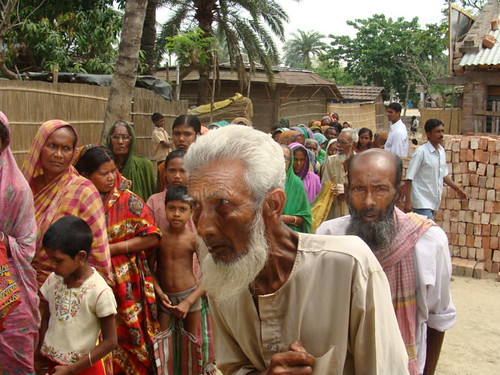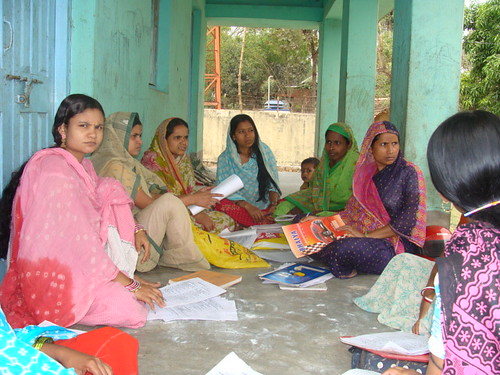Demand grows for reservation for West Bengal Muslims
Justice Sachar Committee report has disclosed the worst condition of Muslims in West Bengal where Left Front has bee in power since last three decades. This eye-opening report provided reasons for Muslims who constitute 25% of the total state population to rethink about continuing their supports to the Left Front.
The cynical role of state government in gloomy incidents of Singur and Nandigram as well as Rizwanur Rahman murderer case increased the anger of Muslims towards it. Consequently, Muslims switched their political allegiance to Mamta Banerjee’s Trinamool Congress which led to Left Front’s debacle in the last General and Panchayat elections.

Now in an attempt to win back the Muslim vote bank in next assembly election expected to be held next year, the state government is planning to follow the pattern of Kerala and other southern states to include more Muslim sub-castes into the OBC category to extend the reservation benefits to more members of the community.
Considering that the recent erosion of the Left Front vote in the minority areas was the big reason for lower performance of the Front, Forward Bloc, one of the partners in Left government, was the first to initiate in this regard by writing to the Chief Minister Buddhadeb Bhattacharjee a few days ago to take up the matter of reservations for Muslims as early as possible to win them back. The CPI and CPM leaders have also agreed to this proposal but the lone partner within the Left Front, the Revolutionary Socialist Party (RSP) differed on the issue.
Ironically, Muslims who are most backward community have only 2% share of reservation under the OBC folder in West Bengal while half of the Hindus, who are the 71% of the state population, are enjoying reservation as SC/ST.
However, avoiding the constitutional bar which is against religion-based reservations state government is going to bring as many Muslim castes in the OBC category as possible. Currently, only 12 Muslim castes are under the OBC but now Chief Minister Buddhadeb Bhattacharjee has asked West Bengal Backward Classes Commission to identify another 28 Muslim castes to include them in OBC list. If it will be implemented nearly 10% reservation will be available for Muslims in the state.
According to Sayed Masudal Hussain, member of West Bengal Backward Classes Commission presently Muslim castes like Ansaris (weavers), Qureshis (butchers) are among the 12 Muslim castes under OBC reservation. But now castes of Muslims like Beldar (grave diggers), Abdal (sweepers), Mahaldar (fishermen), Kahar (palanquin bearers) and many others will be able to get reservation through the OBC quota. The work in this regard is going on.
On the other hand the West Bengal Minorities Commission has backed the demand for reservation of Muslims and termed it necessary for bridging the widening gap between Hindus and Muslims in all spheres of the society. Chairman of the commission, S Z Adnan, said it was time for the government to take emergency measures like reservation to maintain the balance between two communities.
Meanwhile, state unit of Jamia’t Ulema-e-Hind (JUH) also raised the voice in the favor of reservations for Muslims to solve their educational and social backwardness at a conference organized in famous Dharmatala ground, Kolkata on January 29th.
Talking to TwoCircles.net, Maulana Siddiqullah Choudhury, general secretary of West Bengal JUH, said: “10% reservation will not be enough to solve the West Bengal Muslim problems. Therefore, we demand 20% reservation because currently only 2.5% Muslims are in government job while they comprise 30% of the total population of the state.”
It was the first such impressive conference on reservation issue which was attended by almost 1.5 lak people from across the state as well as outside of it. “We gave ultimatum to the government to take the decision on the matter on earliest because we can not wait any more. We have fed up of promises since last 30 years now government has to step in practically” he added.
About the next step in this connection Maulana Choudhry who is also the president of a political party namely Public Democratic Conference of India (PDCI) said: “We are going to hold a vehicle-rally from January 6th to 8th which will begin from Kolkata and will be visiting all Muslim dominated areas of the state to create awareness among the community. It will not be our last step but our efforts will continue until demands are fulfilled.”
“Almost all leading Muslim organizations and groups including Jam’at Islami Hind, Indian Muslim League, All India Milli Council and Republican Party of India are with us in this struggle” he continued.

He further said that government policies pushed the community to the appalling condition. So, it is its responsibility to restore their lives and that would be possible only by reservation.
He also criticized Congress and Trinamol Congress: “These two parties promised in the recently concluded election manifestos that they will ease the way for Muslim reservation but now they are keeping silent. They should learn from the fiasco of Left Front” he said.
Keeping an eye on Assembly elections, the Left Front besides considering the reservation for Muslims, it also ordered concerned agencies to expedite job-oriented development projects in the Muslim-dominated blocks of Murshidabad, North and South 24-Parganas, Malda, Nadia, Birbhum, Howrah, Burdwan and Kolkata to regain the confidence of the minorities.
However, it will be interesting to see that how state government will settle the matter because if it fails to take decision about reservation then it will heavily pay for it in the coming assembly elections as it already got warning bells in Lok Sabha as well as in Panchayat elections and its decision in the favor of reservation may bring dispute among allies





